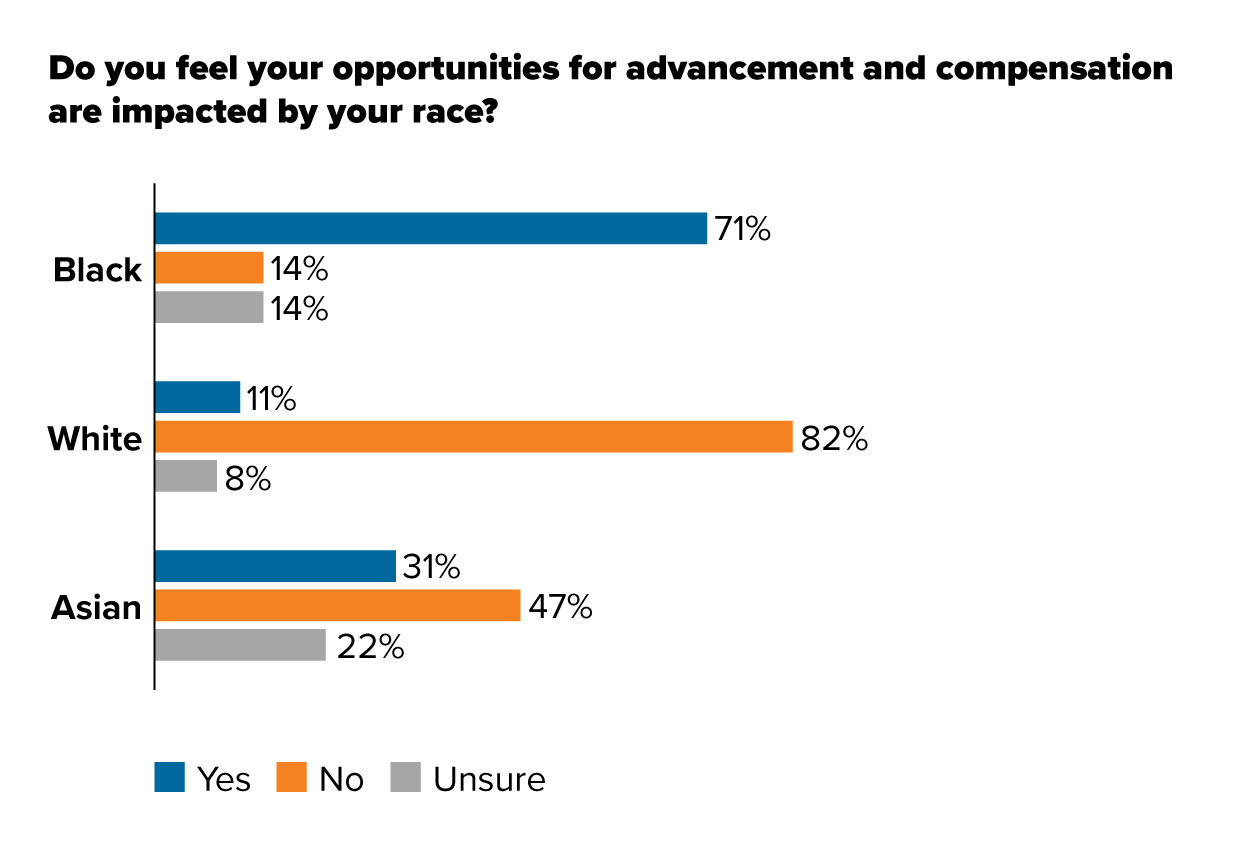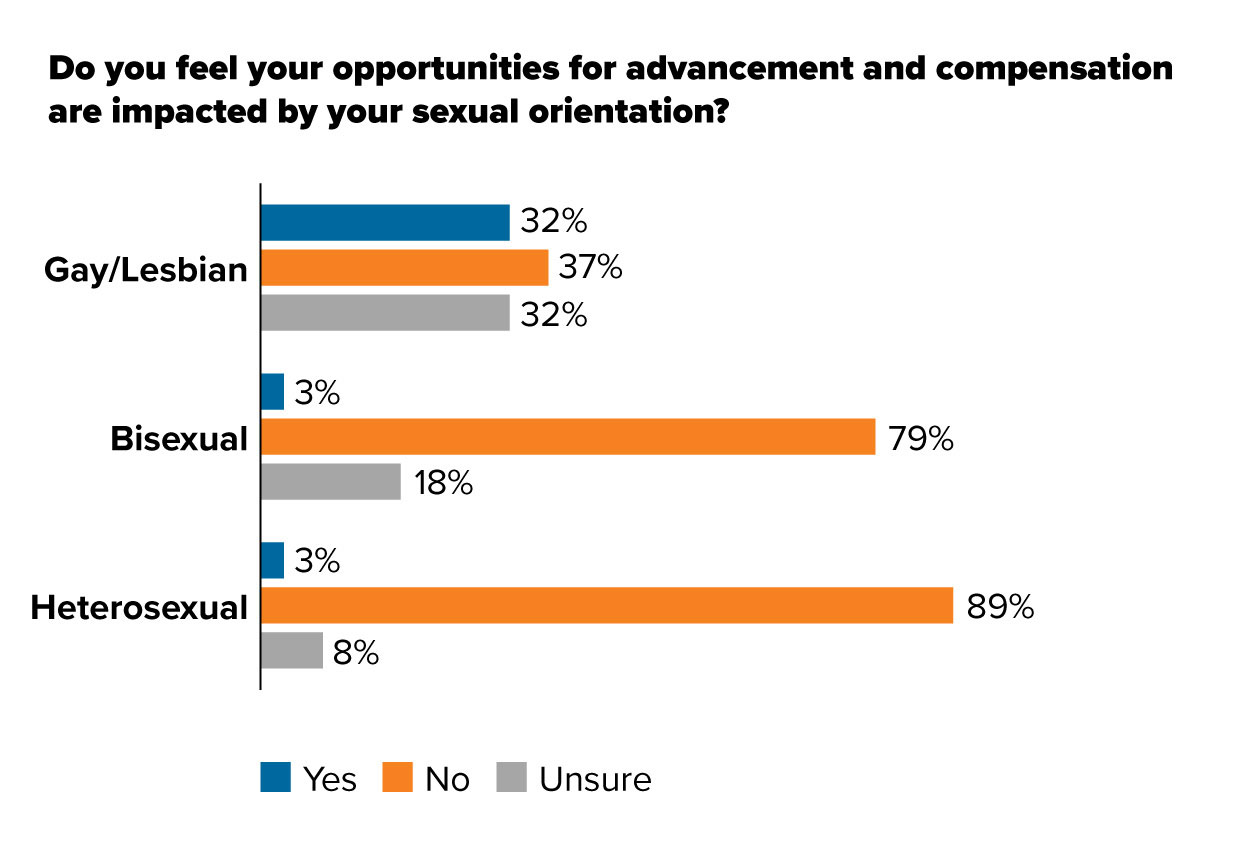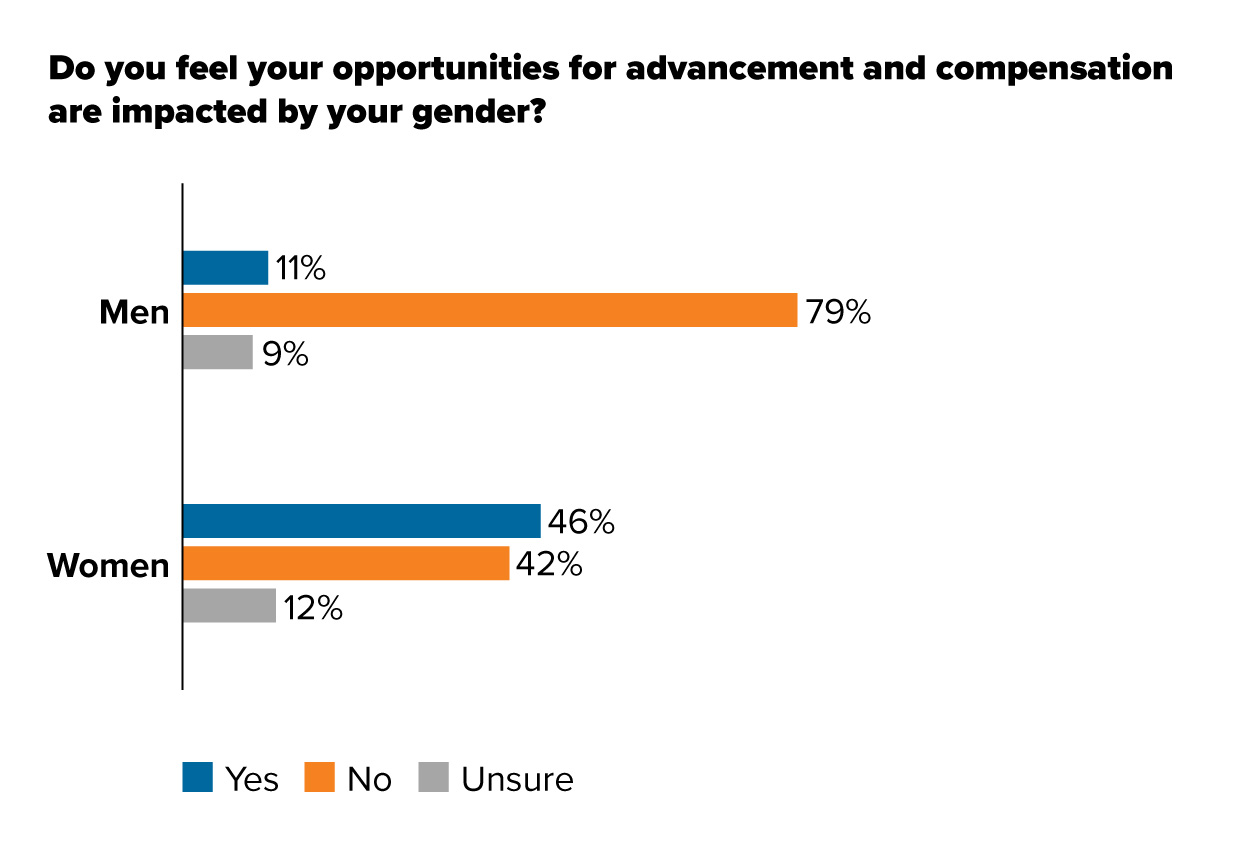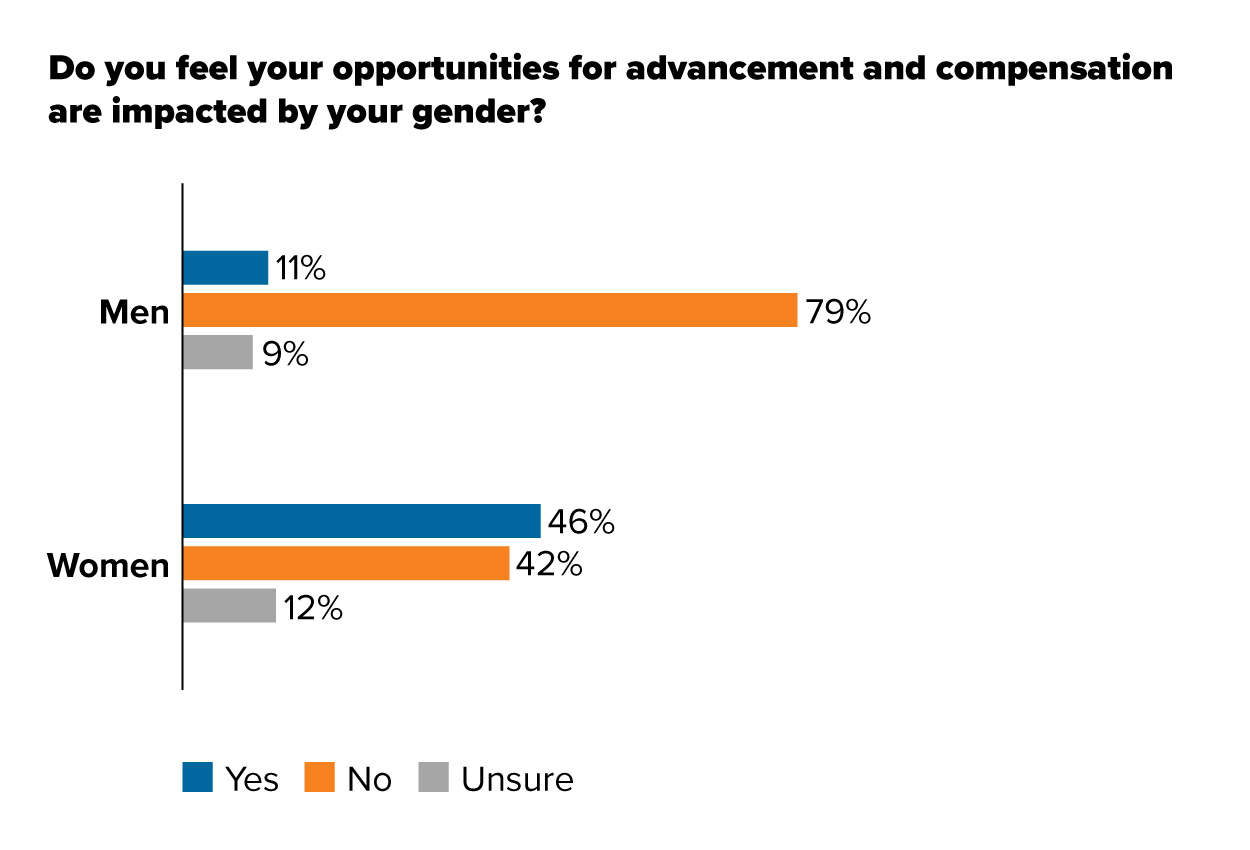When Career Paths Get Bumpy
IFT Career Path Survey respondents offer candid commentary on the impact of race, sexual orientation, and gender on career progression.
The 2022 IFT Career Path Survey asked respondents if they thought that gender, race, or sexual orientation affected their opportunities for advancement and compensation, and for many Black, gay, and female survey respondents, the answer was yes.
Seven out of 10 Black survey takers (71%) who answered the question thought their race had affected their opportunities; another 14% were unsure. Among gay respondents, nearly one-third (32%) thought their sexual orientation had an impact on their careers and another 32% were unsure. Nearly half (46%) of the women who answered the question noted an impact on opportunities, and 12% were unsure. (Note: The pool of Black survey respondents was relatively small in size, which meant that the margin of error was +/- 12%.)
Some of the survey participants within these three subsegments told Food Technology about their professional experiences.
Racial Realities
Larry Keener, a highly regarded microbiologist and process authority and president and CEO of International Product Safety Consultants, vividly remembers not being able to get past the receptionist for a job interview.
“Getting that first job was a monumental challenge,” says Keener, who is Black. “I mean [it was] to the extent that I thought I wasn’t going to have a career in the sciences. I recall going to a genetics house down in the Bay Area after graduating and going in for an interview and being rebuffed by the receptionist.”
But on at least one occasion, Keener says, his race may have worked to his advantage. “I was the first African American scientist hired by the National Food Processors Association that was founded in 1918. I think I’m pretty safe in saying that in this instance, my race, my ethnicity, might have helped me get a job because they needed an African American person on their staff.
“So you see how complicated the narrative is,” Keener reflects. “In one instance, the receptionist keeps me from getting an interview. But then in another instance, there is a social need, a social construct that says that we should probably do a better job of diversity, with this national trade association for the food processing industry. And, therefore, my showing up as an African American man worked to my advantage.”
The reality of racial bias persists, as Keener illustrates with this description of a recent experience: “I was at the corporate headquarters of a big multinational corporation. There were several of us standing in the reception area, all talking. One of the company’s, middle managers or upper middle managers, came down and came over to me and says, ‘So are you my limo driver?’ I was the only Black person standing in the reception area. And so she came over and asked if I was her limo driver.
“And everybody in the room turned and looked at her aghast. So finally, one of the company employees grabbed her and ushered her out of the space. I mean, embarrassed. But again, this is the subtle kind of racism that we still have to put up with now.”
Sometimes it’s not subtle. As one associate professor employed at a university in the Southern United States observed: “Being Black, especially if you are directly of African descent, is still a problem for the majority of the American universities down South—at least in mine. My experience is not peculiar to me alone.
“I am in my ninth year as a faculty [member] in a research-intensive program, and I am yet to be invited by any of my 18 colleagues to serve on a single graduate student committee—I mean zero invites in eight-plus years.”
Navigating Roadblocks
After nearly three decades in the profession, Melvin Pascall, who is Black, is philosophical about the impact of his race on career progression. He has faced barriers because of his race, he acknowledges, but he has always figured out ways to deal with them.
“I wouldn’t say that it hindered my career advancement because I was able to develop my career in spite of it,” says Pascall, a professor in the Department of Food Science and Technology at The Ohio State University.
“I think that these are things that one has to learn how to navigate,” he says. “You just have to learn how to be successful in spite of these things.”
Pascall says it’s a skill he has honed over the years. “As you get more mature in your career, you learn how to deal with these things better just because of the experience. Coming out of grad school and when I started working, I clearly did not really deal with these things as well as I am now. And that’s just because of maturity and experience.”
Picking his battles has been a key part of Pascall’s approach. “There are people who will have tendencies not to be fair and equitable,” he reflects. “You can’t change that, but you can advance yourself in spite of it.
“And you can’t fight every issue that comes up. Some issues you ignore; some you don’t. I would not subscribe [to a philosophy] that you just let people abuse you and you don’t do anything about it. But at the same time, you don’t respond to everybody on every issue that comes up.
“For example,” says Pascall, “everybody may not want to work with you because of preconceived opinions, but you have to know the value of networking and you have to build your network. Don’t wait for the network to come to you. Be proactive in building a network from people who are honest, people who are open-minded, and people who are not prejudiced. And there are people out there like that.”
Talking About Sexual Orientation
Gay food science professionals who responded to the survey had wide-ranging perspectives on whether sexual orientation had affected their careers.
“Being gay is not widely accepted in the food industry,” one respondent noted in the survey. “Passing as straight helps mitigate the downside.”
“Depending on where I am in the United States, visiting a plant or a factory in a professional capacity, I have to discern whether to hide the details of my life for fear of repercussions/danger,” another noted.
Former IFT Student Association President Matt Teegarden likely can appreciate that perspective. “There have been several jobs that I’ve come across, especially when I was first looking right after school, where I was very qualified for the role, very excited about the role, but it was in a location that I wouldn’t feel safe living in as an openly gay man,” says Teegarden, who currently works as a senior researcher at The Ohio State University. “So it automatically disqualifies me from applying for it because I won’t move there.
“It does feel quite limiting from a career perspective because I know that there are companies that I would love to work for that just have a location that I would never move to,” he adds.
“The geography has a lot of do [with it], especially in the United States,” agrees a commercial manager in the food and ingredients industry. But perhaps because he grew up on the East Coast and is currently based there, he doesn’t feel limited.
“It’s a big country with a big, diverse set of opinions. … There are plenty of opportunities and places to go where [people can be their authentic selves],” he continues. “There’s plenty of opportunities to do it. So I don’t want people to feel stuck.”
For Teegarden, finding a work environment that’s aligned with his values is a priority. “For me, it’s important to see that they have an active resource group in the company. It’s nice if that resource group is established for a number of years, it’s not just a new thing.
“It’s also important to me to see that, even little things of, do they celebrate Pride Month in some way? Do they change the logo on their LinkedIn page or make posts about this and things like that? I think that goes a long way.”
Reinforcing that Ohio State is a good fit for Teegarden is the fact that the university’s president is a gay woman. “That was huge for me because … it’s visibility of my community in a top leadership position.”
Being open about sexual orientation feels fraught with anxiety for some.
Hugh B., a senior R&D food scientist working in private label contract manufacturing, is among that group. “I’m still not entirely comfortable talking about sexual orientation,” says Hugh, who identifies as a gay male. … “It is something I have never told any colleagues or employers I’ve been with during my career for fear of being judged or seen as inadequate.
“It’s something I’ve been worried about,” he adds. “I do tend to overthink things outside of the immediate work requirements, like this exact topic and how I may be fitting in—or not—within the culture of a company. I always wonder how people would think about or see me by knowing this very personal fact,” Hugh reflects. “So, maybe in essence, I’m creating my own barrier to some degree through fear?”
Hugh was so reluctant to reveal this aspect of himself that when his common-law partner was laid off from his job and lost his health benefits, he chose to pay for his partner’s medical expenses rather than enroll him as a spouse on his insurance plan—even though that option was available to him.
“I purposefully chose not to because the medical insurance provider did not administer the health-care program; a manager at my company did. I could not add medical without going through my employer. Since I did not want to have this part of who I am ‘out there,’ … I chose to pay for those medications myself—about $1,000 to $2,000—rather than potentially be judged or thought of differently by coworkers or my employer. Now, I could afford to do that until my partner got back on his feet, but what about others who come up against the same barrier who cannot afford to do that?”
William Melnyczenko’s perspective has evolved over the past decade or so. As a young man in his 20s, working as an operations manager in food production, he thought it would be disadvantageous to reveal the fact that he is gay. “I felt as though some people that I worked with had been in their positions for quite some time and held a very conservative worldview, an old-school mentality if you will, around gender roles, gender identity, and sexual orientation. As I managed different groups of people, from many different ethnic and socioeconomic backgrounds, many of which were first generation, I ran into closely held religious beliefs or personal beliefs that homosexuality or being gay was not acceptable.
“Many had preconceived notions about what gay people were like, or what they did, or biases, and I believe it was detrimental not only to me but to the greater unity of the team.
“I was very much hesitant to be openly gay, especially leaving operations and moving into a commercial role as it was totally new for me, and I just didn’t know how I would be treated or how welcoming the industry was,” continues Melnyczenko, who is currently employed by Mérieux NutriSciences as global business development director digital and expert services.
“Even into my first job in sales, I wouldn’t say that I was closeted, but I did not disclose during my interview process that I was gay,” Melnyczenko continues. “I didn’t openly disclose that I had a partner. I was very guarded with who I shared that with.”
Eventually, though, as Melnyczenko moved into sales roles, he encountered a more welcoming environment than when he worked in operations, and he’s found people in the food science industry to be open-minded and welcoming. “I think there’s such an awesome mix of people in our industry who share different perspectives and different backgrounds, and that is very welcomed to help tackle and overcome business objectives,” he says.
“To me, being gay doesn’t seem like an issue,”Melnyczenko continues. “It’s like being left-handed; no one really cares. They’re like, ‘Great, good for you. So how are we going to solve this problem and make money? Let’s do this.’ So having that weight lifted off, I felt like it’s really allowed me to genuinely be impassioned about what I was doing, and then, people feed off that. They see that you’re passionate about their shared objective, shared goals. And then your career rolls out in front of you after that point. When you’re able to be happy in what you’re doing and live your life without fear, it makes a big difference.”
Women Weigh In
Forty-six percent of women who responded to the Career Path Survey said they felt their opportunities had been affected by their gender versus 42% who said they were not affected, and 12% who were unsure.
The findings are fairly consistent with those of the 2019 IFT Employment and Salary Survey, which asked a similar question. In that survey, 48% of women said they thought their career opportunities had been affected by their gender, 34% said their careers were not impacted, and 18% felt unsure about it.
Alexandra Wiedeke, who is employed by food tech startup Wonder as a senior manager, food science & safety, loves life at her current employer and appreciates its women’s resource groups and the support she’s received for building a female mentorship program. But her work environment wasn’t always so supportive, particularly when she was employed in the restaurant industry.
“For my career, specifically in food science, I don’t find that it [gender] has been a massive barrier,” Wiedeke says. But, earlier in her career, working on the foodservice side, she notes, “I faced a lot more sexism and sexual harassment.”
Harassment, glass ceilings, mansplaining, lack of respect in the workplace, and inadequate maternity leave policies were among the challenges cited by Career Path Survey participants.
“My views and contributions are not looked upon the same as my male counterparts,” said one research and development technician. Frustration about not being taken seriouslywas a repeated refrain among woman who shared comments in the survey questionnaire.
“Men are listened to more than women,” said one. “I have repeatedly offered an opinion/suggestion, and when a man mentions the same thing (in the same meeting), it is suddenly his great idea.”
“Men feeling the need to explain concepts to me that I didn’t ask for further explanation on” and “being told to smile more” were sources of frustration for another. “Being talked over or talked down to, being treated as if I don’t have the business know-how to handle a situation,” was a negative experience another female respondent cited.
“As a younger female, it is challenging to have your ideas and suggestions be taken seriously,” said another. “People frequently interrupt me while I am speaking.”
Working in operations can present particular challenges, according to some. “As a female in operations, it is hard to earn the respect of men who make up a large portion of the workforce,” one woman observed. “It even more difficult to get those same individuals to respect your decision-making abilities.”
Another cited “difficulties as a young female in plant settings with respect and getting my trial done successfully, feedback that I was rude or too aggressive when asserting myself and holding my ground on what I need (especially in manufacturing settings).”
Women weren’t the only ones to cite gender as a barrier. Eleven percent of male survey respondents said their gender had an impact on opportunities, and some mentioned race as well.
“I am male, in a world focused at advancing women,” said one. “Nothing wrong with that, but sometimes it feels inequitable.”
“Earlier in my career it was a benefit to be white and male,” another respondent noted. “Seems that now it has become a disadvantage.”
Are you getting a competitive salary? Is your career on track?
The new 2022 IFT Compensation and Career Path Report is an invaluable resource. IFT's exclusive research benchmarks total compensation, including salary and benefits across the science of food profession. This year’s report expands to include global insights on job satisfaction, career pathways and barriers.
Food Technology Articles

Professional Fulfillment After Office Hours
IFT President Sean Leighton and several IFT members reflect on the value of volunteering.

Can Food Science and Technology Transform the Food System?
IFT President Sean Leighton reflects on the value of collaboration within the science of food discipline and highlights the value IFT FIRST will offer in this area.

The Transformative Power of Positivity
Columnist Kantha Shelke makes the case for adopting an appreciative inquiry approach to the science of food.

Investing in African Heritage Foods
Foods from the African continent, such as millet and hibiscus, are starting to trend in Western diets. WANDA cofounder Tambra Raye Stevenson says that these foods could help solve the nutrition crisis.

Finding Joy in Lifelong Learning
IFT President Sean J. Leighton reflects on the importance of continuous learning.
Recent Brain Food

A New Day at the FDA
IFT weighs in on the agency’s future in the wake of the Reagan-Udall Report and FDA Commissioner Califf’s response.
Members Say IFT Offers Everything You Need to Prepare for an Uncertain Future
Learn how IFT boosts connections, efficiencies, and inspiration for its members.

More on the FDA's Food Traceability Final Rule
In a new white paper, our experts examine the FDA’s Food Traceability Final Rule implications—and its novel concepts first proposed by IFT.
Job Satisfaction in the Science of Food is High but Hindered by Pain Points
IFT’s 2022 Compensation and Career Path Report breaks it down.








